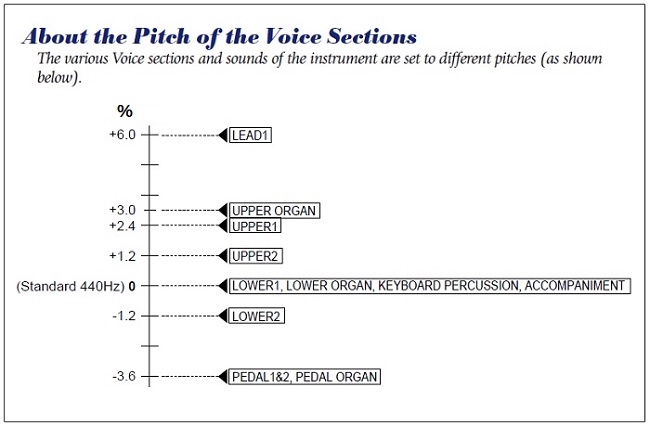Pitch within keyboards ...
We all realise that in an orchestra, for example, all the violins will be fractionally out of tune with each other. This is true for all groups of similar instruments. We probably can't tell, until we hear them play together. But that is precisely why live bands/groups have “colour”.
The AR organs have various parts tuned slightly differently to each other, to help this enrichment.
(This is not true of all organs - the AR's are special! I admit that I am biased, of course.)
The Pitch of the Yamaha AR .. (taken from the Owner's Manual)
We can further adjust the Lead, to make it “stand out” even more.
(This is a common trick of Jazz musicians.)
By the way, this is why the AR manual will advise you, when tuning the AR to match the pitch of another instrument, you should use the Clarinet on the Lower Keyboard, with effects like Tremolo and Symphonic turned off.
My question is simply this, and purely because I am curious ……
Do Keyboards, like the Tyros, have something similar within them to enrich their sound?
Can anyone satisfy my curiosity, please?
Warmly as usual,
Peter
The AR organs have various parts tuned slightly differently to each other, to help this enrichment.
(This is not true of all organs - the AR's are special! I admit that I am biased, of course.)
The Pitch of the Yamaha AR .. (taken from the Owner's Manual)

We can further adjust the Lead, to make it “stand out” even more.
(This is a common trick of Jazz musicians.)
By the way, this is why the AR manual will advise you, when tuning the AR to match the pitch of another instrument, you should use the Clarinet on the Lower Keyboard, with effects like Tremolo and Symphonic turned off.
My question is simply this, and purely because I am curious ……
Do Keyboards, like the Tyros, have something similar within them to enrich their sound?
Can anyone satisfy my curiosity, please?
Warmly as usual,
Peter